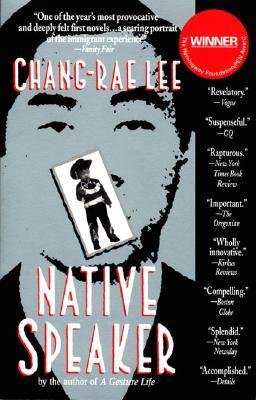
He's a Korean-American. But he doesn't know much about Korea, and is not sure any more if he knows about America at all.
Henry Park is a Korean-American. He was born in America, so naturally he thinks and acts like any American you meet on the street. He's a native speaker, you could say. But he's in the same trap just like every immigrant living in a foreign country. He doesn't feel like belonging to neither to the country he was born and raised nor to the country his heritage came from. The author Chang-rae Lee himself was born in South Korea and moved to the USA when he was three, basically making him the second generation of Korean-American. I guess his experience as a Korean-American somehow made its way into Henry Park's anguish.
I can easily assume how tremendously difficult it was for the immigrant parents to live in a country that didn't share the language and culture of their own. They must have gone through lots of trouble and ordeals. During the whole time, their only hope must have been their children; if and when their children become successful in America, all their hardship would be heavily rewarded, they must have believed.
So they're pecking at their children: to study, to succeed, to earn lots and lots of money. Go to Ivy league, be an attorney or a doctor. Be a successful Korean-American in the mainstream America.
To the eye of the children, their immigrant parents look very weird. They want them to be Americans but at the same time they're afraid that their children will become Americans. They want them to be successful in America, but they hate America. America is a place where people have free sex, young people enjoy drugs, and everyone shoots each other with guns, they complain. Being raised under those parents, it's hard for the children to decide if America is a sold ground to step on or a minefield to be cautious.
Their parents don't know about America. Therefore they can't provide the necessary information and advice that will be helpful to their children. Their parents are not the people whom they could turn to when things go wrong. It's the other way around, if any. When things go wrong, their parents turn to them to solve the problems because now their English is much better than their parents.

Source: Goodreads
It's a bit sad to read this kind of stories. Since America is a country of immigrants, many people will go through somewhat similar experiences. I hope they could find pride in their ethnic heritage, at the same time being a proud American. It's easier said than done, but at least we could try.
A Few Good Lines from the Book
1.
I know over the years my father and his friends got together less and less. Certainly, after my mother died, he didn't seem to want to go to the gatherings anymore. But it wasn't just him. They all got busier and wealthier and lived farther and farther apart. (p. 72)
2.
"So what's her name?" Lelia asked after a moment.
"I don't know"
"What?" I told her that I didn't know. That I had never known."What's that you call her, then?" she said. "I thought that was her name. Your father calls her that, too."
"It's not her name," I told her, "It's not her name. It's just a form of address."It was the truth. Lelia had great trouble accepting this stunning ignorance of mine. (p. 95)
In Korea, people don't address elders' their names. We have other forms of address. So very often than not, young people don't know the names of elders, even though they're close enough.
3.
I'm afraid that the world isn't governed by fiends and saints but by ten thousand dim souls in between. (p. 257)
4.
We listen to the earnest attempts of their talk, the bits of their stilted English. I know I would have ridiculed them when I was young: I would cringe and grow ashamed and angry at those funny tones of my father and his workers, all that Konglish, Spanglish, Jive. Just talk right, I wanted to yell, just talk right for once in your sorry lives. But now, I think I would give most anything to hear my father’s talk again, the crash and bang and stop of his language, always hurtling by. I will listen for him forever in the streets of this city. (p. 432)
Title: Native Speaker
Author: Chang-rae Lee
Disclaimer) There's only first part of the storyline in this review to introduce the book. No major spoiler included.
Here are the recent 5 bookreviews that I wrote.
If you follow @bree1042, you can read many more interesting bookreviews!
#10. The Secret Life of Bees by Sue Monk Kidd - The Road to Find Myself
#11. The Lovely Bones by Alice Sebold ㅡ To Become Family Again
#12. Trouble by Gary D. Schmidt - To Find Out How to Live with Trouble
